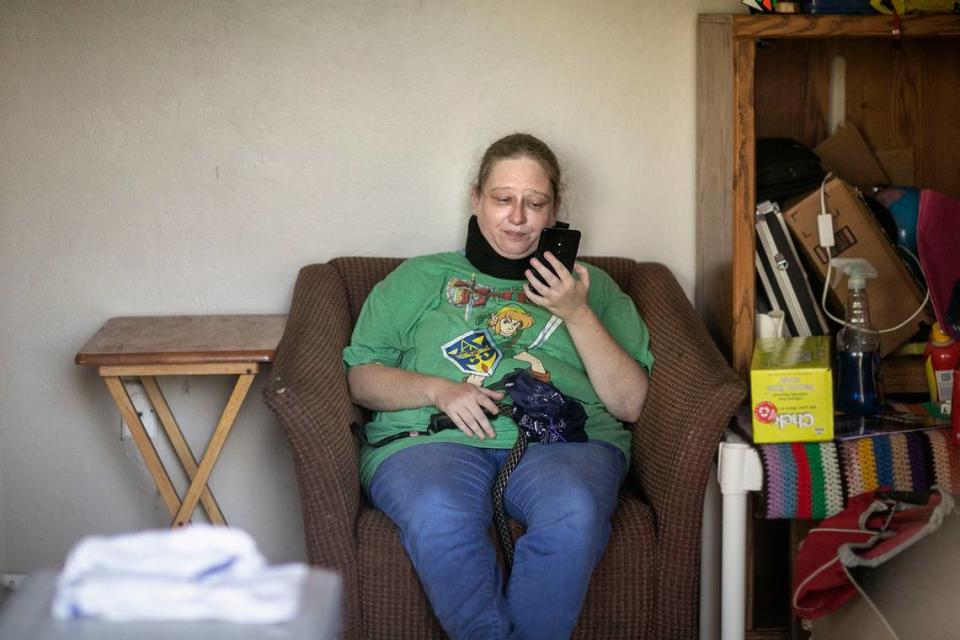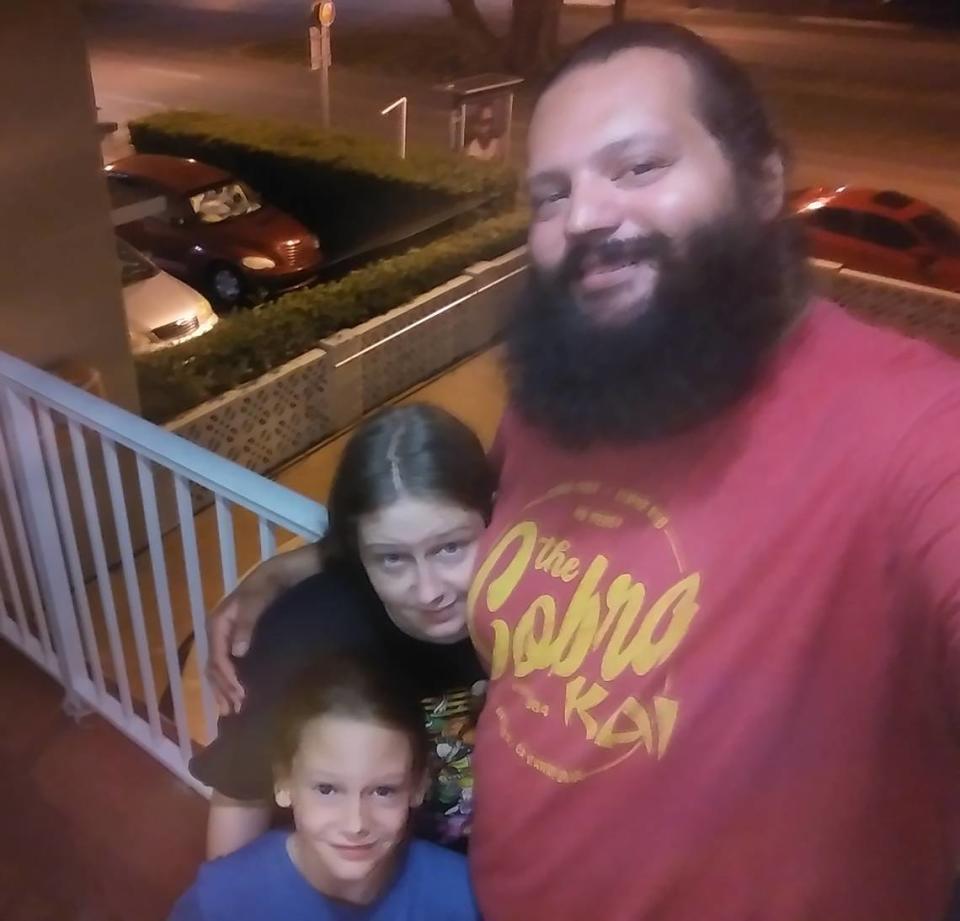You’ve survived the hellish slog through Florida’s ‘reemployment’ gauntlet. Here’s your prize
Miami resident Danielle Rivera is 36-years-old and mother to a 7-year-old son, Emmett. She has a disability and cannot work a job outside her home. Her husband, Anthony, age 35, recently lost his work as a chef at a restaurant due to the economic fallout caused by the outbreak of the coronavirus. She is worried about making ends meet. Her biggest fear: impending homelessness.
Anthony has already filed for unemployment benefits but his account is yet to be authenticated by Florida’s Department of Economic Opportunity despite sending in his identifying documents and repeatedly calling and emailing the office.
The Miami Herald has previously reported on the state’s understaffed, underfunded and now over-burdened unemployment benefits system, where the chief obstacle is calling in to get a PIN to complete the process. The number rings busy around the clock, with only about 2 percent of calls getting through, according to the Tampa Bay Times.
But that’s only one factor working against the newly unemployed. The plight of recently laid off and furloughed Floridians is particularly bleak compared to other states, compounded by the fact that the state has among the most miserly unemployment-benefit caps in the country — a maximum of $275 a week, or $1,100 a month.
The $275-a-week cap hasn’t increased in more than 20 years. The same cannot be said of the cost-of-living of the newly unemployed, a group that disproportionately includes those who worked in lower-income jobs.

A comparison of unemployment benefits for each state shows Florida fifth from last, tied with Tennessee, barely edging out Alabama, Mississippi, Louisiana and Arizona, places where the cost of living is significantly lower than, say, Miami Beach.
When it comes to the number of weeks an eligible person can receive the benefits, Florida is dead last, weighing in at 12.
Florida is not the most expensive of states, but it is far from the least expensive. According to a Miami Herald analysis of data on cost of living, Florida ranks 28th in the United States. Among the 67 counties in Florida, Collier, Monroe and Martin counties are the three most expensive to live in. Miami-Dade ranks 13th.
The data is compiled by the Council for Community and Economic Research and relies on information from the U.S. Bureau of Economic Analysis. To calculate a cost of living index and compare between states, it takes into account factors like population, population density, income per capita, growth rates for both population and income per capita, government cost, and unemployment rate. The Miami Herald analyzed the 2019 version of the data — the most recent figures available.
The people most directly impacted by the economic shutdown, those working in retail and hospitality, often don’t have much of a cushion to fall back on.
When he had his job, Anthony Rivera earned around $1,900 a month, Danielle said. Their total household expenses including rent for their one-bedroom condo and utilities is roughly $1,300.
Danielle has herniated discs in her neck, nerve damage and rheumatoid arthritis and requires the use of mobility aids to walk any significant distance, she said. She works from home through Mechanical Turk, an Amazon-operated crowdsourcing website for businesses to hire people for work like data entry, writing product descriptions or identifying content in videos.
“We’ve managed to pay our bills for April, but have no clue what we’ll do in the future,” she said.
In Florida, the lowly compensation for those who have lost their jobs is a feature not a bug.
The system is designed not so much as a safety net to cushion the blow but as a tool to supply businesses with people to fill often low-paying jobs — and grow the economy.
Normally to qualify for continuing benefits, an applicant must show he or she has applied for five jobs in the previous week.
It’s one reason Florida calls its unemployment office the office of Reemployment Assistance. The system worked as intended over the past decade as the economy prospered and employment increased.

The model breaks down when there are few jobs to apply for, as is currently the case, and the website for applying for benefits undergoes a meltdown.
Mark Wilson, president of the Florida Chamber of Commerce said “no unemployment system in the United States was built for a global pandemic” and in ordinary circumstances the system works because Florida typically has more jobs than people looking for them.
“Florida’s system is built for people who want to work,” he said. “Sixty days ago it was the best system in the country and a year from now after we’re on the other side of COVID, it’ll be the best system in the country again.”
The federal government is supplementing state-level unemployment payments with $600 per applicant per week. The hitch is that the money will be funneled through the individual states’ unemployment infrastructure. That’s a challenge for many states, but especially Florida, with its presently overwhelmed application process. No one knows when the financial relief — state or federal — might flow properly.
According to a public statement by the Department of Economic Opportunity, the state is updating its online unemployment benefits application system, accepting paper applications and also waiving the “waiting week”, so individuals can claim their first week of Reemployment Assistance. The requirement that applicants demonstrate they have applied for five jobs has been put on hold.
Recipe for disaster
Massachusetts Institute of Technology’s Living Wage Calculator estimates that single adults with no children need to earn roughly $26,000 to live in relative comfort in Florida, a number that many in South Florida, with its spiraling rents, would dispute. MIT also estimates that food preparation and service-related workers earn only around $21,500 annually. People working in sales earn roughly $26,500, maintenance and sanitation workers make $24,500 and healthcare support workers earn $29,000.
During the Great Recession of 2007-08, laid-off workers could get benefits for up to 26 weeks. But in 2011, as the economy was coming back to life, then-Gov. Rick Scott and the Republican-dominated Legislature opted to cut taxes on companies and reduce that safety net to 12 weeks.
“For many, many years there has been the goal of saving the state money, lowering employer taxes and lowering benefits ,” said Arthur Rosenberg, a former lawyer at Florida Legal Services who lobbied against the 2011 changes.
Now the state’s junior senator, Scott, whose net worth is at least $166 million, recently argued in favor of reduced unemployment benefits in the $2 trillion federal stimulus package, saying that such benefits would discourage people from trying to get a job.
State Sen. Joe Gruters of Sarasota, who now heads the Florida Republican Party, declined to comment for this story.
The low cap on benefits, shorter-than-normal eligibility span and bollixed-up process for applying digitally are putting laid-off and furloughed workers in a precarious position. Many worry they will be financially ruined.
Among them is Carmen Cordoba, a 53-year-old who until recently worked at a Macy’s in Fort Myers. She is now furloughed indefinitely. Her husband, Peter Becker, is 10 years older and is a sales employee at a cigar store. Since the store he works at is now closed, he too is out of a job.
“We don’t have any other income or another job,” said Cordoba. “We don’t have anything anymore.”

Lee ranks 17th out of Florida’s 67 counties when it comes to cost of living, Miami Herald’s analysis of the cost of living data found.
The couple live in an apartment and have two pets — a cat and a dog. They also have some outstanding loans and credit cards to pay off. Cordoba said that their monthly expenses come to nearly $2,000 a month.
Cordoba said she has applied for other work online but has received no response yet. The high cost of living coupled with uncertainty regarding when they will receive their unemployment benefits and how much is now her biggest concern about the near future.
“I don’t know how we’ll pay the rent or buy food for ourselves or our pets,” she said.
Maria Leticia Gonzalez Moreno, one of Cordoba’s former co-workers at Macy’s, is in a similar fix. She too was furloughed last week. She had been working at Macy’s for 13 years.
“The unemployment benefit was something that was supposed to be faster but I don’t know how long the money that I have is going to last,” she said. “We don’t know what is going to happen.”
Moreno’s husband, 68, is retired. Normally she earns around $600 a month. After deducting costs for health insurance, she gets to take home around $400 to $450, she said. Her monthly expenses — a mortgage for her home and utilities — come to around $850.
The recent stimulus bill, the CARES Act, passed by Congress and signed by President Donald Trump on Mar. 27, is what provides the $600 per week supplement until July 31, 2020. It also mandates that the Internal Revenue Service send a one-time payment of up to $1,200 to American taxpayers with a Social Security number. The payment is reduced — on a sliding, based on income, down to zero — for Americans making more than $75,000.
“Benefits will be paid from the date they became eligible under the CARES Act,” the Department of Economic Opportunity said in a public statement. “At this time, individuals who apply for Reemployment Assistance whose employment was negatively impacted as a result of COVID-19 will follow the same application, review and payment process as all applicants for Reemployment Assistance in Florida.”
“I don’t know when that money is going to come, but I have to pay the bills,” said Moreno. “I am scared because I don’t know when I’m going to go back to work.”
Anti-poverty advocates, including Carolina Fernandez-Mazzoni of Catalyst Miami, an advocacy group working on issues affecting low-wealth families, say a change is needed. Given that “Florida has become a low-wage, high-cost state, especially in its urban areas, and many workers are employed by industries that are effectively closed for business right now or have dramatically reduced operations”, the state should raise the amount and duration of unemployment benefits, she said.

“These workers not only make low wages, they are unlikely to have paid leave and very likely to have little-to-no financial cushion to sustain them through an economic downturn,” she added.
“We need to ensure [these] families are not feeling the long-term effects of this pandemic.”
The economic downturn has led some to look for alternative sources of income. For people like Rivera, the Miami resident, the usual work opportunities through Mechanical Turk are drying up.
“There’s so many people now, there’s a lot more competition,” she said. “Jobs I could grab before, people are snapping ‘em up.”
Rivera and her husband worry about not having enough money to pay for rent and being left out on the street with their 7-year-old.
“Our landlord’s small. He’s not a big corporation, she said. “They need to pay their bills, too.”
”Right now they have the moratorium [on evictions] in place but once that’s lifted, if we don’t have the money, our landlord’s gonna evict us.”
McClatchy data reporter Ben Wieder contributed to this report. The Miami Herald’s congressional correspondent Alex Daugherty also contributed.

